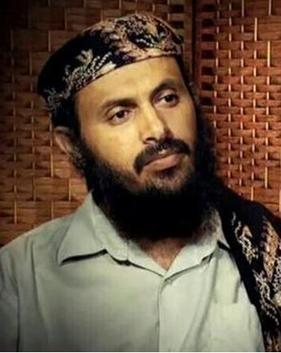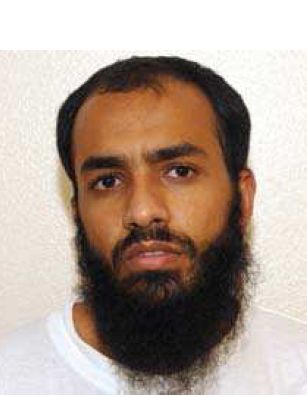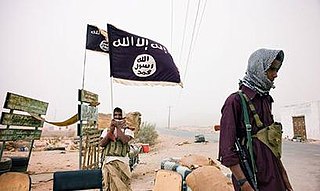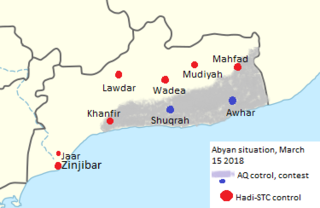Related Research Articles
In its war on terrorism in Yemen, the US government describes Yemen as "an important partner in the global war on terrorism". There have been attacks on civilian targets and tourists, and there was a cargo-plane bomb plot in 2010. Counter-terrorism operations have been conducted by the Yemeni police, the Yemeni military, and the United States Armed Forces.

The Aden-Abyan Islamic Army is an Islamist militant group based in southern Yemen, led by Zein al-Abideen al-Mehdar. The group has been designated as a terrorist organization by Bahrain, Canada and the United Kingdom. The group is thought to have organized in southern Yemen in the mid 1990s, with members that include veterans from the Soviet war in Afghanistan. Their stated mission is to "promote jihad in the fight against secularism in Yemen and other Arab States; to establish an Islamic government in Yemen".
Ali Abdullah Ahmed, also known as Salah Ahmed al-Salami, was a citizen of Yemen who died whilst being held as an enemy combatant in the United States Guantanamo Bay detainment camps, in Cuba. His Guantanamo Internment Serial Number was 693. Joint Task Force Guantanamo counter-terror analysts estimated he was born in 1977, in Ibb, Yemen.

Al-Qaeda in the Arabian Peninsula, abbreviated as AQAP, also known as Ansar al-Sharia in Yemen, is a Sunni Islamist insurgent extremist group, which is part of the al-Qaeda network and primarily active in Yemen and Saudi Arabia. It is considered the most active of al-Qaeda's branches that emerged after the weakening of central leadership.

Sa'id Ali Jabir Al Khathim Al Shihri (1971–2013) was a Saudi Arabian deputy leader of the terrorist group Al-Qaeda in the Arabian Peninsula (AQAP), and possibly involved in the kidnappings and murders of foreigners in Yemen. Said Ali al-Shihri was captured at the Durand Line, in December 2001, and was one of the first detainees held at the Guantanamo Bay detention camps, in Cuba, arriving on 21 January 2002. He was held in extrajudicial detention in American custody for almost six years. Following his repatriation to Saudi custody he was enrolled in a rehabilitation and reintegration program. Following his release, he traveled to Yemen.

Nasir Abdel Karim al-Wuhayshi alias Abu Basir, was a Yemeni Islamist, who served as the leader of al-Qaeda in the Arabian Peninsula (AQAP). Both Saudi Arabia and Yemen considered al-Wuhayshi to be among their most wanted fugitives. In October 2014, the US State Department increased the reward for any information leading to the capture or killing of al-Wuhayshi to US$10 million, the same as ISIS leader Abu Bakr al-Baghdadi. Wuhayshi was killed in a US drone strike in Hadhramaut Governorate of Yemen on 12 June 2015.

Qasim Yahya Mahdi al-Raymi was a Yemeni militant who was the emir of al-Qaeda in the Arabian Peninsula (AQAP). Al-Raymi was one of 23 men who escaped in the 3 February 2006 prison-break in Yemen, along with other notable al-Qaeda members. Al-Raymi was connected to a July 2007 suicide bombing that killed eight Spanish tourists. In 2009, the Yemeni government accused him of being responsible for the running of an al-Qaeda training camp in Abyan province. After serving as AQAP's military commander, al-Raymi was promoted to leader after the death of Nasir al-Wuhayshi on 12 June 2015.

Ibrahim Hassan Tali al-Asiri was a citizen of Saudi Arabia suspected of being chief bomb-maker of al-Qaeda in the Arabian Peninsula. He was reported to have been responsible for making the bombs used by his brother Abdullah al-Asiri in his suicide bombing, the 2009 Christmas Day bomb plot, the 2010 cargo plane bomb plot, and the May 8th 2012 Terror Plot.
Abdul Haq al-Turkistani is a Uyghur Islamic militant and terrorist who leads the Turkistan Islamic Party. The United States Treasury reported he took over leadership of the organization in 2003, following the death of its previous leader, and took a seat on al-Qaeda's shura in 2005.

The Al-Qaeda insurgency in Yemen is an ongoing armed conflict between the Yemeni government, the United States and their allies, and al-Qaeda-affiliated cells in Yemen. It is a part of the Global War on Terror.
The Battle of Zinjibar was a battle between forces loyal to Yemeni leader Ali Abdullah Saleh and Islamist militant forces, possibly including elements of al-Qaeda in the Arabian Peninsula (AQAP), for control of the town of Zinjibar and its surroundings as part of the wider insurgency in the self-declared Al-Qaeda Emirate in Yemen. Many of the Islamist forces operating in Abyan province refer to themselves as Ansar al-Sharia.

Muhammaed Yasir Ahmed Taher was a citizen of Yemen, who was held in extrajudicial detention in the United States's Guantanamo Bay detention camps, in Cuba. His Guantanamo Internment Serial Number was 679. American intelligence analysts estimate he was born in 1980, in Ibb, Yemen.

Muhsin Fadhil Ayed Ashour al-Fadhli was an alleged senior leader of Khorasan, an offshoot of the al-Nusra Front, a branch of al-Qaeda.
The following lists events that happened during 2012 in Yemen.

United States drone strikes in Yemen started after the September 11, 2001 attacks in the United States, when the US militant attacked Islamist military presence in Yemen, in particular Al-Qaeda in the Arabian Peninsula using drone warfare.
In early December 2015, two Yemeni towns, Zinjibar and Ja'ar, were captured by the jihadist group Al-Qaeda in the Arabian Peninsula (AQAP). This was the second capture and occupation of Zinjibar during unrest in Yemen. The town was earlier taken by AQAP's in May 2011 and held until the summer of 2012.

The Shabwah Governorate offensive is an insurgent campaign by Al-Qaeda in the Arabian Peninsula (AQAP) forces to take control of Shabwah Governorate during the Yemeni Civil War.

The Islamic State – Yemen Province is a branch of the militant Islamist group Islamic State (IS), active in Yemen. IS announced the group's formation on 13 November 2014.

The Abyan conflict was a series of clashes between forces of AQAP loyal to Yemeni president Abdrabbuh Mansur Hadi, and forces loyal to Southern Movement for the control of Abyan between 2016 and 2018.

The following outline is provided as an overview of and topical guide to the Wikipedia articles available about the Yemeni Crisis, revolution, and Yemeni civil war (2014–present).
References
- ↑ Ivan Aditya (2017-03-04). "Ahli Bom Al Qaeda Tewas" [Al Qaeda bomb expert killed] (in Indonesian). Krjobja . Retrieved 2017-03-10.
Menurut pejabat keamanan AS serangan udara itu menewaskan Mossad al-Adani, Emir al-Qaeda di wilayah Abyan dan ahli bahan peledak. Kematian al-Adani diyakini akan menjadi pukulan telak bagi kelompok teroris bentukan Osama bin Laden.
[ permanent dead link ] - ↑ "Bekas tahanan Guantanamo terbunuh dalam serangan AS di Yaman" [Former Guantanamo detainees killed in US attack in Yemen] (in Malay). Washington DC: BH Online. 2017-03-07. Retrieved 2017-03-11.
Yang turut terbunuh, pakar letupan, Usayd al-Adani. Dia juga berperanan sebagai ketua daerah kumpulan al-Qaeda di Semenanjung Arab.
- ↑ "Bekas Napi Guantanamo Tewas dalam Serangan Udara AS di Yaman" [Former Guantanamo Inmates Killed in US Air Attacks in Yemen] (in Indonesian). Tempo. 2017-03-07. Retrieved 2017-03-11.
Belum diketahui apakah Yasir al-Silmi menjadi salah satu target serangan, tetapi Kapten Davis kepada Reuters mengatakan bahwa dia bukanlah target kelas kakap.
- ↑ "US air raids target al-Qaeda in Yemen, wound civilians". Al Jazeera. 2017-03-03. Retrieved 2017-03-10.
The air raids also struck the home of al-Qaeda's commander in the area, Saad Atef, tribal sources told the AFP news agency.
- 1 2 3 Courtney Kube (2017-03-03). "Yemen Strike Kills Al Qaeda Bombmaker, Officials Say". NBC News . Retrieved 2017-03-10.
The death of Mossad al-Adani, al Qaeda's emir of Abyan governorate and an explosives expert, is a "blow to al Qaeda in the Arabian Peninsula," according to the officials. Also killed in that same strike was a former Guantanamo detainee, Yasir al-Silmi. He was at Guantanamo from 2002 to 2009
- ↑ Missy Ryan, Julie Tate (2016-03-06). "U.S. air campaign in Yemen kills former Guantanamo detainee". Washington Post . Archived from the original on March 7, 2017.
Silmi, a Yemeni national who had also gone by the name Mohamed Tahar, was arrested in Pakistan in 2002, and handed over to U.S. authorities in May of that year. While U.S. officials suspected him of having ties to al-Qaeda plots, Silmi, like the vast majority of the more than 700 inmates who have been held at Guantanamo since 2002, was never charged with a crime.
- ↑ Lucas Tomlinson (2017-03-07). "Ex-Gitmo detainee killed in US airstrike in Yemen, Pentagon says". Fox News . Retrieved 2017-03-06.
Yasir al-Silmi, who was held at Guantanamo Bay from 2002-2009, was killed in airstrikes on March 2, Davis said.
- ↑ "Former Guantanamo detainee killed in US air strike in Yemen". BBC News. 2017-03-06. Retrieved 2017-03-06.
He was killed in the same strike as Usayd al-Adani, "a long-time Al-Qaeda in the Arabian Peninsula explosives expert and facilitator who served as the organisation's emir," Cpt Davis said.
- ↑ Lolita C. Baldor (2017-03-06). "US airstrikes kill former Guantanamo detainee in Yemen". Star Tribune. Archived from the original on 2017-03-06. Retrieved 2017-03-10.
The 12-page memo, signed by Rear Adm. Mark Buzby, who was commander at the detention center at the time, raised Tahar's risk level from medium to high.
- ↑ "US Strikes Pound Qaida for Second Day". Naharnet. 2017-03-03. Retrieved 2017-03-11.
Yemeni officials said at least 12 suspected militants were killed in those strikes, which came barely one month after a botched US commando raid against the group left multiple civilians and a Navy SEAL dead.